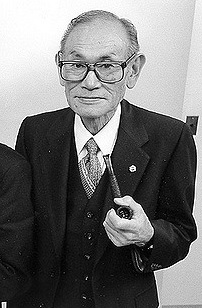Fred
Korematsu 是松豊三郎 | |
|---|---|
 | |
| Born | Fred Toyosaburo Korematsu January 30, 1919 Oakland, California, U.S. |
| Died | March 30, 2005 (aged 86) Marin County, California, U.S. |
| Resting place | Mountain View Cemetery 37°50′06″N 122°14′12″W / 37.83500°N 122.23667°W |
| Monuments |
|
| Alma mater | Castlemont High School |
| Known for | Korematsu v. United States |
| Spouse |
Kathryn Pearson (m. 1946) |
| Children | 2 |
| Awards | Presidential Medal of Freedom (1998) |
| Website | korematsuinstitute |
Fred Toyosaburo Korematsu (是松豊三郎, Korematsu Toyosaburo, January 30, 1919 – March 30, 2005) was an American civil rights activist who resisted the internment of Japanese Americans during World War II. Shortly after the Imperial Japanese Navy launched its attack on Pearl Harbor, President Franklin D. Roosevelt issued Executive Order 9066, which authorized the removal of individuals of Japanese ancestry living on the West Coast from their homes and their mandatory imprisonment in incarceration camps, but Korematsu instead challenged the orders and became a fugitive.
The legality of Roosevelt's order was upheld by the Supreme Court of the United States in Korematsu v. United States (1944).[1] However, Korematsu's conviction for evading internment was overturned four decades later in US District Court, after the disclosure of new evidence challenging its necessity, which had been withheld from the courts by the U.S. government during the war.[2] Korematsu was discussed seventy-four years later in Trump v. Hawaii (2018), with Chief Justice John Roberts writing: "The forcible relocation of U.S. citizens to concentration camps, solely and explicitly on the basis of race, is objectively unlawful and outside the scope of Presidential authority."[3][4] Legal scholars differ as to whether this statement actually overturned Korematsu or was merely a "disapproving dictum" of it.[5]
To commemorate his journey as a civil rights activist posthumously, "Fred Korematsu Day of Civil Liberties and the Constitution" was observed for the first time on his 92nd birthday, January 30, 2011, by the state of California, the first such commemoration for an Asian American in the United States. In 2015, Virginia passed legislation to make it the second state to permanently recognize each January 30 as Fred Korematsu Day.[6][7][8]
The Fred T. Korematsu Institute was founded in 2009 to carry on Korematsu's legacy as a civil rights advocate by educating and advocating for civil liberties for all communities.
- ^ Ford, Matt (November 19, 2015). "The Return of Korematsu". The Atlantic. Retrieved January 30, 2017.
- ^ Savage, David G. (May 24, 2011). "U.S. official cites misconduct in Japanese American internment cases". Los Angeles Times. Archived from the original on June 9, 2011. Retrieved August 10, 2019.
- ^ "Trump v. Hawaii Is Korematsu All Over Again". www.tuckerellis.com. Retrieved September 10, 2020.
- ^ "Trump v. Hawaii" (June 26, 2018) (PDF) p. 38
- ^ Jurecic, Quinta (June 28, 2018). "The Travel Ban Decision and the Ghost of Korematsu". Lawfare. Archived from the original on October 31, 2023.
- ^ "Welcome". Fred T. Korematsu Institute. Retrieved June 15, 2016.
- ^ "California Marks the First Fred Korematsu Day". Time. January 29, 2011. Archived from the original on February 2, 2011.
- ^ "Fred Korematsu Day a first for an Asian American". San Francisco Chronicle. January 29, 2011.